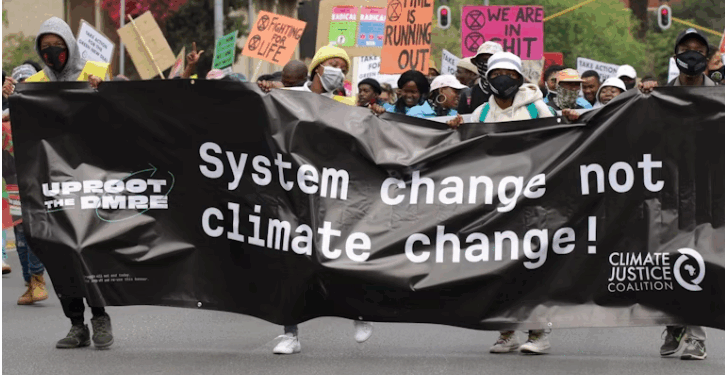“Reduce, reuse, recycle.” For more than 50 years, those three Rs have been the world’s go-to environmental mantra. On the face of it, the three Rs sound like an empowering call for each of us to play our part for the planet. However, the individualist approach behind the slogan has come in for increasing criticism by climate change activists.
I am one of them. As a scholar-activist who has spent over 16 years working with climate justice movements, I have studied how movements are challenging the individualistic focus to climate change – an approach that is heavily promoted by corporate public relations campaigns.
Fossil fuel corporations have worked with public relations firms to convince the public that environmental problems are the fault of consumer behaviour. One of the main aims of these campaigns is to shift attention and blame away from the main actors responsible for ecological destruction – wealthy corporations, polluting industries and the captured governments that enable them.
Individual emissions within the average person’s direct control account for less than 20% of total emissions. The vast majority come from industrial systems and infrastructure beyond people’s control.
The fossil fuel industry’s public relations campaigns also want individuals to focus on their own environmental footprint so that they are distracted from pushing for more structural and policy driven changes. Those structural changes would threaten the profits of the fossil fuel industry.
Read more: Fossil fuel greenwashing ‘pervades’ South African media
Read more: Ad agencies pressure their colleagues not to work for fossil fuel companies
Read more: Bans on fossil fuel advertising are coming
The Intergovernmental Panel on Climate Change, the world’s leading authority on climate change, has said that
rapid and far-reaching transitions across all sectors and systems are necessary to achieve deep and sustained emissions reductions.
Compared to the scale of change we need, “reduce, reuse, recycle” falls short.
Building on that evidence, climate ethics literature, and discourse analysis, in a newly published book chapter I argue that it’s past time to go deeper than just the old “Three Rs”. In addition, environmental education should embrace new, more radical mantras that tackle the root causes of our ecological crises, such as Regulation, Redistribution, and Reparations.
These more radical Rs focus on the structural and economic factors that drive ecological crises, working to reorient societies towards more socially and ecologically just ends. Social movements are increasingly realising that we need to focus on such systemic factors, which is part of why the slogan “Systems Change, Not Climate Change” has become such a key rallying call for climate justice movements across the world.
Regulation: reining in polluters
The first R is regulation – putting in place strong, enforceable rules to rein in destructive industries and hold elites accountable. Corporations have tried to sell the idea that they don’t need to be regulated and that markets will solve the problem. However, despite decades of voluntary corporate pledges, most businesses are far off track.
Recent research into 23,200 companies from 14 industries across 129 countries found that nearly 75% had no official plans in place (climate transition plans) to end their greenhouse gas emissions. Fossil fuel companies are continuing to investing in vast amounts of new oil, gas and coal production – even though the world already has much more fossil fuel than we can burn to avoid climate catastrophe.
Redistribution: funding a just transition
The second R is redistribution – shifting wealth and resources away from wealthy and destructive industries, towards a more socially and ecologically just future.
Along those lines, South African trade union federations Cosatu and Saftu have proposed progressive taxes on wealth, pollution and financial transactions to fund a just transition for workers and communities. Similar proposals have been put forward in many other countries, including by the Africa Tax Justice Network.
Such progressive taxation is especially key in deeply unequal countries like South Africa, where 10% of the population owns more than 80% of the wealth. Tackling that inequality through fair taxation, divestment from fossil fuels, and reinvestment in community-led projects is essential.
Redistribution can help ensure that the benefits of climate action reach those most affected by the crisis, and help us build a more prosperous, and socially and ecologically just future.
Reparations: repairing and rebuilding
The third R, reparations, recognises that today’s ecological crisis is rooted in centuries of colonial extraction and exploitation.
Africa is the continent least responsible for the climate crisis, yet it experiences countless climate disasters. Therefore reparations should mean debt cancellation, technology transfer, and climate finance from wealthy polluting nations – not as loans, but as debt payments.
However, reparations should be about more than just financial transfers. As philosopher Olúfẹ́mi O. Táíwò argues, reparations are a world-making project. In other words, they can be used to rebuild relationships, communities, societies and ecosystems that were damaged by colonialism, capitalism and environmental racism.
Reparations should form the basis of creating new systems based on social and ecological well-being, not exploitation.
What needs to happen next
Even the most diligent recycling or green consumerism simply won’t get us to zero emissions. For example, during the 2020 Covid-19 lockdowns when much of the world stayed home, global emissions fell by only 8%.
That was a large, unprecedented drop. But it came nowhere near enough to get us to the needed goal of net zero or even negative overall human-caused emissions.
None of this is to say that one shouldn’t reduce, reuse, or recycle. However, we must be careful to focus too heavily on individual actions at the expense of structural change.
A similar lesson can be drawn from the history of struggles for racial justice. One of the founders of the Black Consciousness Movement in South Africa, Stephen Bantu Biko, critiqued how some churches, during apartheid, would blame the poor in South Africa for their poverty.
The churches said people were poor because they were sinful, not because apartheid had been constructed to exploit people and keep them in poverty.
Likewise, the Three Rs can stigmatise individuals as environmental sinners. This removes the attention from the fossil fuelled economic system that’s driving the ecological crisis.
If educators, activists and concerned citizens want to promote an effective environmental ethic, it is vital to move past a narrow focus on individual actions. Rather than trying to clean up the symptoms of the problem, society needs to tackle the roots of the ecological crises we face.![]()
Alex Lenferna, Research fellow, University of Fort Hare
This article is republished from The Conversation under a Creative Commons license. Read the original article.














